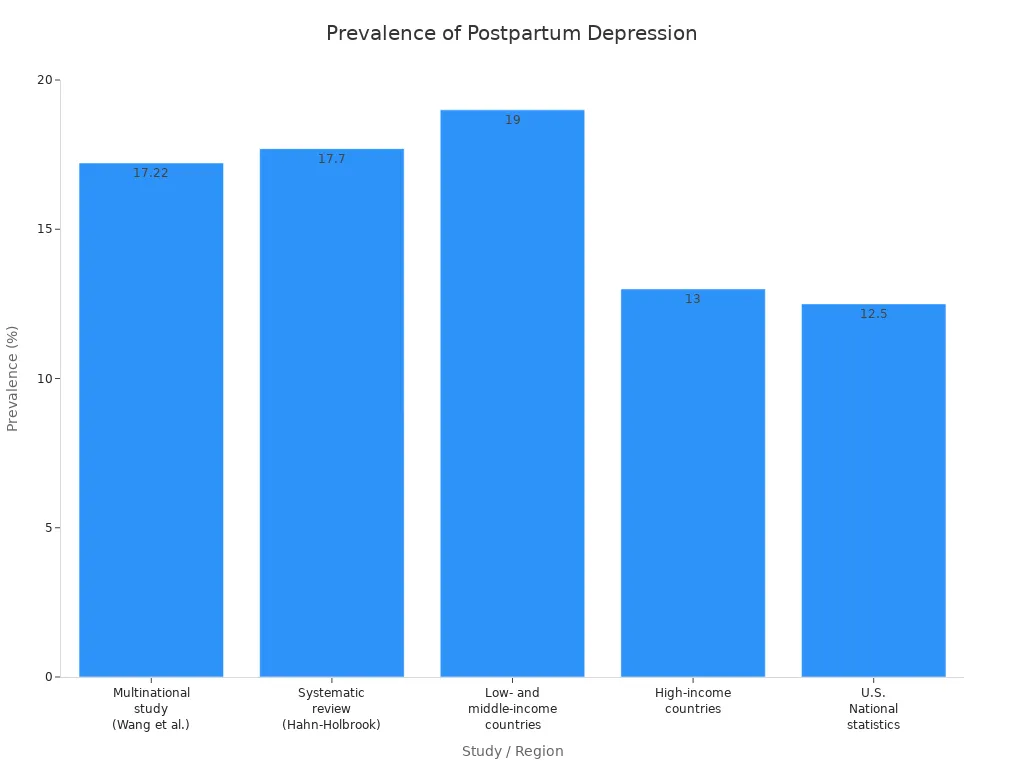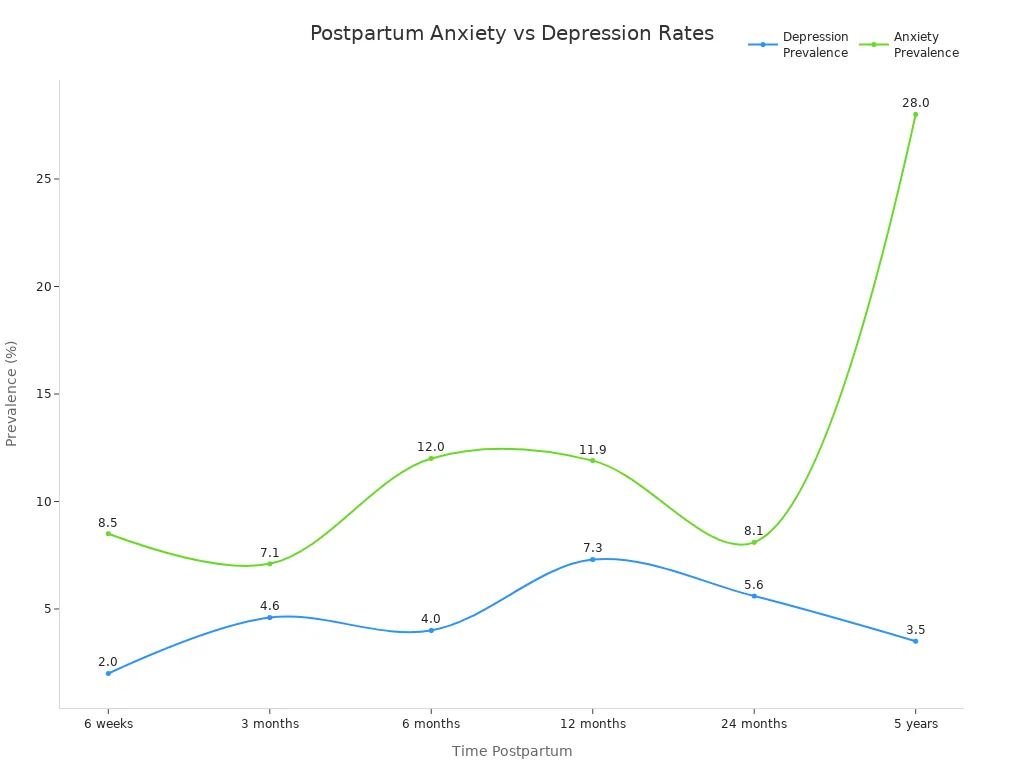You are not alone if you find yourself feeling overwhelmed as a new mum. Up to 85% of new mothers go through mood swings and emotional ups and downs in the first few weeks after giving birth.
Many women experience crying spells, sadness, or even anxiety. These feelings are common and do not mean you are failing.
It is okay to talk about your emotions. You deserve kindness, support, and understanding as you adjust to this new chapter.
Key Takeaways
- Feeling overwhelmed as a new mum is common and normal during the first weeks and months after birth.
- Your body and emotions will change a lot; rest, healthy food, and gentle movement help you heal.
- Baby blues are short term mood swings, but if sadness or anxiety lasts more than two weeks, seek help.
- Support from family, friends, and professionals makes a big difference; don’t hesitate to ask for help.
- Taking care of yourself with sleep, hydration, and small breaks helps you care for your baby better.
Feeling Overwhelmed
Becoming a new mum means lots of changes. You might feel overwhelmed because so much is happening. This is normal when you are adjusting.
Most mums need months to get used to new routines. Experts say the first six weeks are very hard. It can take up to six months to feel settled. Everyone’s experience is different, so give yourself time.
Physical Changes
Your body changes a lot after childbirth. These changes can make you tired or sore. You might not feel like yourself. Here are some common physical changes new mums have:
- Uterine contractions and cramps happen as your uterus gets smaller.
- Vaginal bleeding (lochia) can last up to six weeks.
- Perineal soreness or pain can come from stitches or a C section.
- Breast engorgement, tenderness, or leaking can happen to all mums.
- Swelling from extra fluid is common.
- You may sweat more, especially at night.
- Hair loss can happen because of hormone changes.
- Your weight and body shape may change.
- Urinary incontinence or constipation can occur.
- You may feel very tired from labor and caring for your baby.
Tip: Postpartum checkups help you recover and answer questions. If something feels wrong, talk to your healthcare provider.
Emotional Shifts
Your feelings may go up and down a lot now. Hormone changes after birth can cause mood swings. You might feel irritable or cry for no reason.
Sometimes you feel happy, then sad or anxious. This is very common and does not mean you are doing something wrong.
- Estrogen and progesterone drop fast after birth, which can change your mood.
- You may have mood swings, trouble sleeping, or trouble focusing.
- Some mums feel anxious, irritable, or a little sad. This is called the “baby blues.”
- For some, these feelings get stronger and last longer. This can lead to postpartum depression or anxiety.
Remember, feeling overwhelmed does not mean you are a bad mum. Many women feel this way. Support from family, friends, or professionals helps a lot. Get help early if your feelings get worse or last more than a few weeks. You can find more help at NHS Postnatal Care.
Lifestyle Adjustments
Having a new baby changes your daily life a lot. You may need to change your plans and focus on what matters most—rest, healing, and bonding with your baby.
- Rest as much as you can, especially at first. Try to sleep when your baby sleeps.
- Move gently. Do not lift heavy things or do hard chores. Wait for your doctor to say it is okay to exercise.
- Eat healthy foods and drink water. Good food helps your body heal.
- Let others help you. Friends or family can cook, clean, or watch the baby so you can rest.
- Balance your needs with your baby’s needs. It is okay if your house is messy or you do not finish everything.
- If you go back to work, plan for extra help and be flexible as you adjust.
Most mums need about six months to feel more comfortable with new routines. Some changes, like sleep or body shape, may last longer. That is okay. Every mum’s journey is different.
| Common Lifestyle Adjustments | Why They Matter | Simple Tips |
|---|---|---|
| Prioritizing rest | Helps recovery | Nap when baby naps |
| Gentle movement | Prevents blood clots, aids healing | Short walks, light stretching |
| Accepting help | Reduces stress | Say yes to offers of support |
| Nutrition and hydration | Supports healing | Keep snacks and water nearby |
| Managing expectations | Lowers pressure | Focus on small wins |
If you feel overwhelmed by these changes, you are not alone. Many mums feel this way during this time. Be kind to yourself and remember things will get easier.
Baby Blues vs. Postpartum Conditions
Bringing home a new baby can make you feel many things. You might feel happy, excited, or even relieved. Sometimes, you may also feel sad, worried, or have mood swings.
Many new mums wonder if these feelings are normal or something more serious. Let’s talk about what you might feel and how to know the difference between baby blues, postpartum depression, and postpartum anxiety.
Baby Blues
Most new mums get the baby blues. This is very common and starts a few days after birth. You might cry more, feel cranky, or have trouble sleeping. These feelings come and go, but do not last long.
- About 70-80% of new mothers have baby blues in the first two weeks.
- Around 80% (4 out of 5) new parents notice mood swings or sad feelings.
- Baby blues start in the first few days and last up to two weeks.
- Symptoms usually go away on their own without help.
If your mood feels off but gets better after a week or two, you likely have baby blues. This is a normal part of getting used to life with a newborn.
Postpartum Depression
Sometimes, sadness or worry does not go away. You might feel hopeless, empty, or not enjoy things you once liked. Postpartum depression is more serious than baby blues and needs help.
| Symptom Category | Baby Blues Symptoms | Postpartum Depression Symptoms |
|---|---|---|
| Duration | Symptoms come and go, last about 1-2 weeks | Symptoms are persistent and last longer than two weeks |
| Mood | Mood swings, irritability, feeling overwhelmed, anxiety, sadness, crying | Feelings of hopelessness, sadness, worthlessness, constant crying |
| Cognitive/Focus | Trouble concentrating | Trouble thinking and focusing |
| Sleep/Eating | Sleep difficulties, exhaustion | Inability to eat or sleep |
| Emotional Bonding | N/A | Lack of bonding with the baby |
| Social Behavior | N/A | Withdrawal from family members |
| Additional Symptoms | N/A | Anxiety and panic attacks, anger, loss of interest in activities, fatigue, guilt, thoughts of self-harm or harming the baby |
| Severity | Mild to moderate | Severe, requires medical attention |
Postpartum depression affects about 17% of new mums worldwide. In the US, about 1 in 8 women have it. Some places report even higher numbers.

You may see these warning signs:
- Feeling sad, worthless, hopeless, or guilty
- Losing interest in things you used to like
- Changes in appetite or not eating
- Trouble sleeping or sleeping too much
- Crying for no clear reason
- Hard time thinking or focusing
- Thoughts of suicide or wishing you were not here
- Not interested in your baby or feeling nervous around your baby
- Thoughts of hurting your baby
If you notice these signs, you are not alone. Many mums feel overwhelmed by these symptoms. It is important to ask for help. You can find more at NHS Postnatal Depression.
Postpartum Anxiety
Postpartum anxiety is common too. You might worry all the time, feel restless, or have racing thoughts. Sometimes, you cannot relax or stop thinking about bad things. This can happen with or without depression.
| Condition | Prevalence Rate (%) | Notes on Comorbidity and Recognition |
|---|---|---|
| Postpartum Depression | 10-15 | Most frequent mental disorder postpartum |
| Postpartum Anxiety | 8-13 | May be as common or more common than PPD; often missed |
| Comorbidity | ~75 | High overlap between anxiety and depression symptoms |

You may notice these symptoms:
- Worry that is hard to stop
- Scary thoughts, especially about your baby’s safety
- Trouble sleeping, even when your baby sleeps
- Feeling tense, restless, or jumpy
- Physical signs like fast heartbeat, nausea, or tight muscles
- Avoiding places or things because of worry
| Symptom Category | Key Symptoms |
|---|---|
| Physical | Trouble sleeping, fast heart rate, nausea, stomach aches, shortness of breath, tight muscles, loss of appetite, trouble sitting still |
| Emotional | Racing thoughts, can’t relax, worrying about unlikely things, trouble focusing, forgetfulness, crankiness, feeling nervous or scared |
| Behavioral | Avoiding activities, people, or places; being too careful; checking things over and over; trying to control situations |
Postpartum anxiety can last for months if not treated. It often happens with depression, so you might have both.
When to Seek Help
You should get help if:
- Sadness, anxiety, or feeling overwhelmed lasts more than two weeks.
- You feel hopeless, not close to your baby, or do not feel love or care for your baby.
- You have had depression, anxiety, or mood problems before.
- You have thoughts of hurting yourself or your baby.
- You notice any symptoms that make daily life hard or stop you from caring for yourself or your baby.
If you ever feel like you are in crisis or think about self harm, call 999 or go to the nearest emergency room right away.
Healthcare providers use tools like the Edinburgh Postnatal Depression Scale (EPDS) to spot these problems early. Getting help early can really help. You can find more advice at NHS Mental Health Support.
Remember, asking for help is a sign of strength. You deserve support and care as you get used to being a mum.
Coping and Self Care
Self Care Basics
Taking care of yourself is not selfish—it is necessary. When you look after your own needs, you can care for your baby better. Healthcare professionals recommend a few simple habits:
- Get as much sleep as you can. Sleep helps your mood and energy. Try to nap when your baby naps.
- Eat healthy foods. A Mediterranean style diet with fruits, vegetables, and fish can boost your mental health and sleep quality. NHS advice on healthy eating.
- Drink plenty of water. Staying hydrated helps your body recover.
- Move your body. Gentle walks or stretching can lift your mood and help you heal.
- Take time for yourself. Even a short shower or a few minutes outside can help you recharge.
Remember, what works for one mum may not work for another. Find what feels good for you.
Coping Techniques
You can use different ways to manage stress and emotions. Many new mums find these techniques helpful:
- Practice deep breathing or mindfulness. These can calm your mind and body.
- Write in a journal. Putting your thoughts on paper can help you process feelings.
- Use humor. Laughing at small things can make tough days easier.
- Plan your day. Make a simple schedule and share tasks with others.
- Take breaks. Step outside or listen to music when you need a moment.
Research shows that emotional coping, like talking about your feelings or taking time alone, can lower stress. Support from your partner or family makes these strategies even more effective.
Support Systems
You do not have to do this alone. Support systems play a big part in your recovery and well being:
- Partners, family, and friends can help with meals, chores, or baby care.
- Community groups, like breastfeeding or parent meetups, offer advice and friendship. Find local support.
- Healthcare professionals, such as midwives or counselors, can guide you through tough times.
- Online forums and helplines connect you with other mums who understand.
Let others help you. Accepting support gives you time to rest and focus on healing.
Finding Support
Asking for Help
You might find it tough to ask for help, but reaching out is a big step toward feeling better. Many new moms worry that asking for support means they are weak. That is not true. You show strength when you speak up about your needs.
Here are some ways to make asking for help easier:
- Write down what feels hardest right now. This helps you see what you need most.
- Keep a list of chores or tasks. When someone offers to help, you can point to the list.
- Ask for help with things like laundry, dishes, or errands. This lets you spend more time with your baby.
- Use online tools like Meal Train or SignUp Genius to organize meals or visits.
- If someone promises help but does not follow through, ask again. Your needs matter.
Remember, even if you just need a nap or a shower, it is okay to say so. People want to help, but sometimes they need you to tell them how.
Resources and Hotlines
You have many places to turn for support. Hotlines and online groups can connect you with people who understand what you are going through.
| Hotline Name | Description | Availability | Contact Information |
|---|---|---|---|
| National Maternal Mental Health Hotline | Free, confidential support for new moms and families. English, Spanish, and 60+ languages. | 24/7 | 1-833-TLC-MAMA (1-833-852-6262) |
| Postpartum Support International Warmline | Info, support, and resources for postpartum mental health. | Toll-free, anytime | 1-800-944-4773 (4PPD) |
| National Suicide Prevention Hotline | Support for people in distress or crisis. | 24/7 | 988 or 1-800-273-8255 |
You can also find help from:
- NHS Postnatal Support
- Online communities like Postpartum Support International and Scary Mommy
- Local parenting centers, lactation consultants, and mental health professionals
Encouragement from Other Moms
Other moms have walked this path and want you to know you are not alone. Many share these tips:
- Rest when you can, even if it is just a few minutes.
- Eat healthy foods and drink water to help your body heal.
- Take gentle walks if your doctor says it is safe.
- Talk with your partner or family about how you feel.
- Use support groups or online forums to connect with others.
- Do not ignore signs of baby blues or postpartum depression. If symptoms last more than two weeks, reach out for help.
- Prepare simple meals ahead of time or ask friends to help with food.
“Asking for help is not a sign of weakness. It is a way to care for yourself and your baby.” – Advice from experienced moms
If you want more advice or to join a support group, check out NCT support groups for local and online options.
It is normal to feel overwhelmed when you are a new mum. Many mums feel this way because of tiredness, feeding problems, or having lots to do.
- Getting help from friends, family, or professionals can really help.
- Being kind and patient with yourself helps you and your baby.
- Over time, things will get easier.
Be gentle with yourself. You are learning and trying your best each day.
FAQ
What should you do if you feel overwhelmed every day?
You should talk to someone you trust. This could be a friend, family member, or your doctor. You can also find support at NHS postnatal support.
Remember, you do not have to handle everything alone.
What are the signs that you need more help?
Look for signs like feeling sad most days, trouble bonding with your baby, or thoughts of hurting yourself. If you notice these, reach out to a healthcare professional right away.
What can you do to make self care easier as a new mom?
Try small steps. Take short naps, eat snacks, and ask for help with chores.
- Keep water nearby
- Go outside for fresh air
Little things can make a big difference.
What resources can you use if you need urgent support?
If you feel unsafe or have scary thoughts, call 999 or visit the nearest emergency room. You can also contact the National Maternal Mental Health Hotline for help any time.
Your safety matters most.



